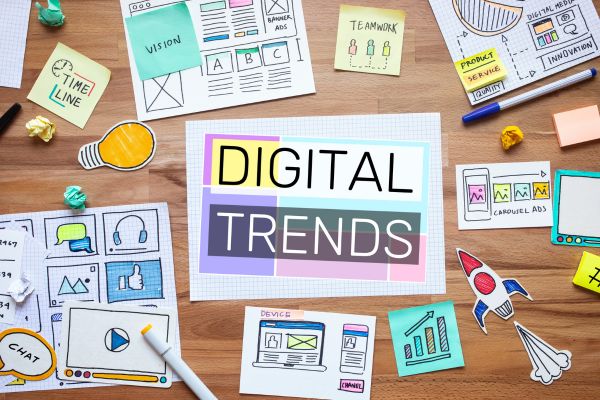In the rapidly evolving digital landscape, staying ahead requires businesses to understand and adapt to the latest digital marketing trends. As technology advances and consumer behaviors shift, marketers must embrace innovative strategies to maintain relevance and gain a competitive edge. This comprehensive guide explores the most impactful digital marketing trends shaping the industry and how businesses can leverage them to achieve sustained growth.
The Rise of Artificial Intelligence in Digital Marketing
Artificial intelligence has transformed the way marketers approach campaigns, audience targeting, and customer engagement. From chatbots that offer instant customer support to AI-powered tools that analyze consumer data for personalized recommendations, the integration of AI is becoming indispensable. Marketers who adopt these technologies can create smarter, more efficient campaigns that resonate deeply with their target audiences.
Machine learning algorithms also allow brands to predict customer behaviors and optimize advertising strategies in real-time. This capability ensures that marketing efforts are not just reactive but also proactive, anticipating customer needs and preferences.
Voice Search Optimization: A Growing Necessity
With the rise of voice-activated devices such as Amazon Alexa, Google Assistant, and Siri, voice search is redefining how consumers find information online. Businesses must now optimize their content to align with conversational queries, which often differ from traditional text-based searches.
Implementing a voice search strategy involves focusing on natural language, long-tail keywords, and featured snippets to ensure higher visibility. Companies that prioritize voice search optimization can tap into a growing segment of consumers who prefer hands-free, on-the-go interactions with technology.
Video Content Dominance in Digital Strategies
Video content continues to dominate digital marketing trends, and its importance is only increasing. Platforms like YouTube, TikTok, Instagram Reels, and Facebook Watch have made video a critical tool for engaging audiences. Consumers are drawn to videos because they are more dynamic, memorable, and easier to consume than text-based content.
Creating high-quality, short-form, and interactive videos can significantly boost brand awareness and drive engagement. Moreover, live streaming has emerged as a powerful way to connect with audiences in real-time, fostering authenticity and trust in brand relationships.
Personalization: Beyond Generic Marketing Messages
Today’s consumers expect personalized experiences from the brands they interact with. Personalization in digital marketing goes far beyond using a customer’s name in an email. It involves analyzing data to deliver content, offers, and recommendations tailored to individual preferences and behaviors.
Brands utilizing advanced personalization techniques see higher engagement rates, increased customer loyalty, and improved conversion rates. By leveraging customer relationship management systems and AI tools, marketers can craft experiences that make customers feel understood and valued.
The Impact of Influencer Marketing on Brand Growth
Influencer marketing has evolved from a niche tactic into a mainstream strategy that delivers substantial ROI. Consumers often trust recommendations from influencers they follow more than traditional advertisements. Collaborating with influencers who align with brand values allows companies to access highly engaged audiences in authentic and meaningful ways.
Micro-influencers, in particular, are gaining popularity due to their strong connections with niche audiences and higher engagement rates compared to larger influencers. Strategic partnerships with these content creators can enhance credibility and drive targeted traffic.
Sustainability and Ethical Marketing Practices
As consumers become more socially and environmentally conscious, they are drawn to brands that reflect their values. Sustainable and ethical marketing practices have emerged as crucial digital marketing trends that resonate with modern audiences.
Transparency, eco-friendly initiatives, and socially responsible campaigns can strengthen a brand’s reputation and foster long-term loyalty. Companies integrating these principles into their digital strategies are better positioned to attract and retain conscious consumers.
The Evolution of Social Commerce
Social commerce blends e-commerce and social media, creating seamless shopping experiences directly on social platforms. Features like Instagram Shopping, Facebook Marketplace, and Pinterest Buyable Pins allow users to discover and purchase products without leaving their favorite apps.
This trend underscores the importance of having a strong presence on social media platforms and optimizing them for shopping. Businesses adopting social commerce strategies can shorten the customer journey and increase conversion rates by meeting consumers where they already spend their time.
Data Privacy and the Shift Toward First-Party Data
With increasing regulations on data privacy, such as GDPR and CCPA, marketers face new challenges in collecting and using consumer data. The phase-out of third-party cookies has further accelerated the shift toward first-party data strategies.
Building direct relationships with customers through email subscriptions, loyalty programs, and interactive content can help brands gather valuable insights while respecting user privacy. Companies that prioritize data transparency and security will build stronger trust with their audiences, ensuring long-term success in the digital space.
Conclusion: Embracing Change for Sustainable Growth
Digital marketing trends are constantly evolving, driven by technological advancements and shifting consumer expectations. Businesses that stay informed and agile in adopting these trends are more likely to thrive in the competitive online marketplace. From leveraging AI and voice search to embracing video content and ethical practices, the opportunities for innovation are endless.
As the digital world continues to transform, one thing remains clear: adaptability is the key to success. By integrating these trends into a cohesive strategy, brands can not only boost their online presence but also forge lasting connections with their customers, driving sustainable growth for years to come.

